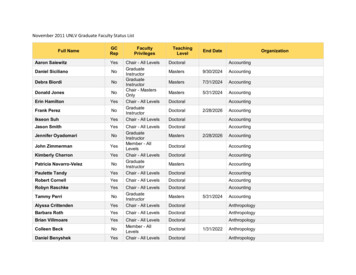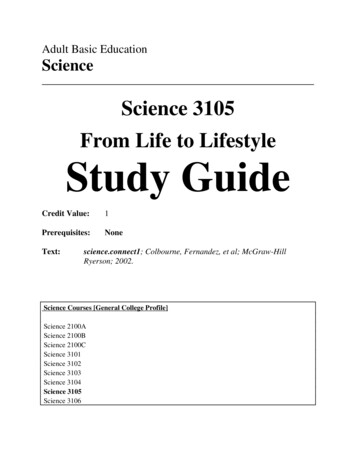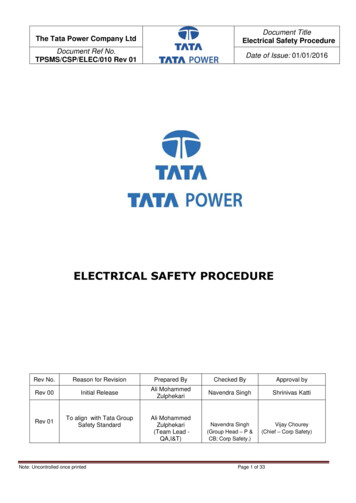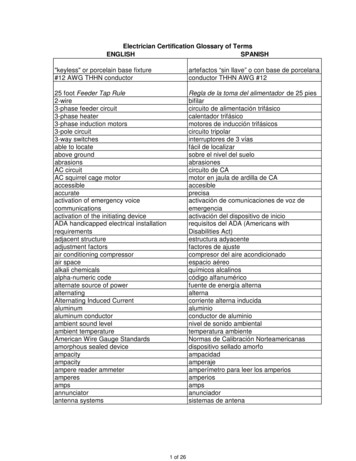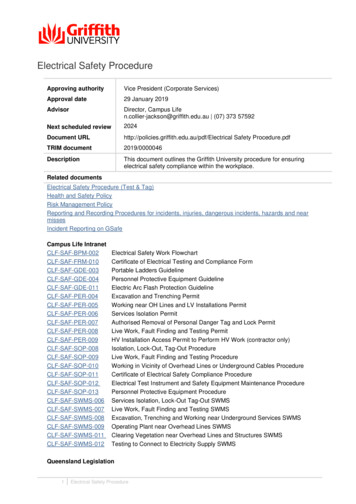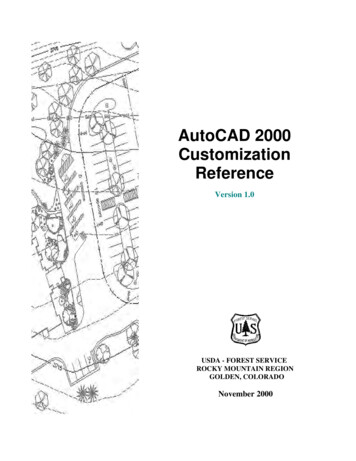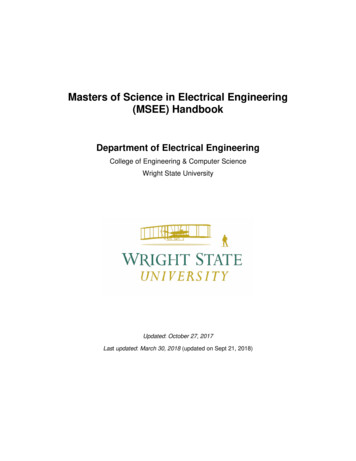
Transcription
Masters of Science in Electrical Engineering(MSEE) HandbookDepartment of Electrical EngineeringCollege of Engineering & Computer ScienceWright State UniversityUpdated: October 27, 2017Last updated: March 30, 2018 (updated on Sept 21, 2018)
Contents1 Purpose . 12 Department of Electrical Engineering. 12.1 Programs . 12.2 Points of Contact .12.3 Faculty .13 M.S.E.E. 43.1 Admission. 43.1.1 Application Process for US Citizens and US Permanent Residents . 43.1.2 Requirements . 43.1.3 Application Process for International Applicants . 43.1.4 GRE Requirement . 53.1.5 Academic Deficiency . 53.1.6 Waivers . 53.2 Degree Requirements .53.3 Graduation .63.4 Course Numbering .63.5 Frequently Asked Questions .74 Financial Support .74.1 Graduate Research Assistantships (GRAs) .74.2 Graduate Teaching Assistantships (GTAs) .84.3 Co-operative Education .84.4 Hourly Employment .8
1 PurposeThe Department of Electrical Engineering offers a program of study leading to a Master ofScience in Electrical Engineering. The program permits concentration of study in specificareas of electrical engineering such as signal processing, wireless communications,control theory, microwave, power electronics, and integrated circuits. Many graduatecourses are offered after 4:00 p.m. or online to serve the educational needs of thepracticing engineering professional as well as the full-time student. This documentaddresses questions that frequently arise in the advising process.2 Department of Electrical Engineering2.1 ProgramsThe Department of Electrical Engineering is one of four departments in the College ofEngineering and Computer Science. The Department offers five degree programs: Bachelor of Science in Electrical Engineering (ABET-accredited)Bachelor of Science in Electrical and Computer Engineering TechnologyMaster of Science in Electrical EngineeringCombined B.S./M.S. in Electrical Engineering (4 1) andDoctorate of Philosophy in Electrical EngineeringFurther information about those programs can be found in respective handbooks publishedby the department and at the weblinks above.2.2 Points of ContactThe EE Graduate Program Director and student advisors can be reached through thedepartment office:Department of Electrical Engineering311 Russ Engineering CenterWright State UniversityDayton, OH 45435ph. 937-775-5037fax 937-775-3936wright.edu/ee2.3 FacultyThe department is currently staffed by twenty-two faculty members, with summaryinformation listed below. Joshua Ash (937-775-3983, josh.ash@wright.edu, 425 Russ Center), AssistantProfessor, Ph.D., The Ohio State University, 2007. Research interests include:statistical signal processing and large-scale Bayesian inference with applications insensor and image processing, hyperspectral imaging, and synthetic aperture radar.1
4903,elliott.brown@wright.edu, 223 NEC), Professor, Ph.D., California Institute ofTechnology, 1985. Research interests include: mm-wave and THz mixers made fromsemiconductor hot-electron bolometers and magnetically-quantized photoconductors. Henry Chen (937-775-5056, henry.chen@wright.edu, 325 Russ Center), Professor,Ph.D., University of Minnesota, 1989. Research interests include: VLSI/FPGA/GPUbased on demand targeted to CMOS nanotechnologies which includes digital, analogand mixed-signal integrated circuits for signal processing, communication, radar andultra wideband receivers. Fred Garber (937-775-5033, fred.garber@wright.edu, 312 Russ Center), Professorand Interim Chair, Ph.D., University of Illinois, 1983. Research interests include:communication systems, target recognition, information theory, and pattern theory. Steve Gorman (937-775-5783, steve.gorman@wright.edu, 329 Russ Center),Instructor, Ph.D., University of Kentucky, 1988. Research interest include: signal andcommunication processing related to geolocation of modern signal transmittersincluding cellular and PC devices. Lang Hong (937-775-5053, lang.hong@wright.edu, 442 Russ Center), Professor,Ph.D., University of Tennessee, 1989. Research interests include: computer vision,image processing and pattern recognition, robotic sensing and control, multisensorsystems, stochastic systems, system modeling and estimation, and multitargettracking. Marian Kazimierczuk (937-775-5059, marian.kazimierczuk@wright.edu, 418 RussCenter), Professor, Ph.D., Technical University of Warsaw, 1978. Research interestsinclude: electronic circuit analysis, high-frequency tuned power amplifiers, powerelectronics, dc-dc PWM and resonant power converters, modeling and control of powerconverters, magnetic components, and renewable energy sources. Pradeep Misra (937-775-5062, pradeep.misra@wright.edu, 424 Russ Center),Associate Professor, Ph.D., Concordia University, 1987. Research interests include:multivariable control theory, robotics and applied numerical analysis. Luther Palmer (937-775-3984, luther.palmer@wright.edu, 242 Russ Center) AssistantProfessor, Ph.D., The Ohio State University, 2007. Research interests include:biologically-inspired robotics and algorithms, walking machines, intelligent search andoptimization. Kuldip Rattan (937-775-5052, kuldip.rattan@wright.edu, 108 Russ Center), ProfessorEmeritus, Ph.D., University of Kentucky, 1975. Research interests include: controltheory, robotics, verification and validation of cyber-physical systems (CPS). Saiyu Ren (937-775-5051, saiyu.ren@wright.edu, 328 Russ Center), AssociateProfessor, Ph.D., Wright State University, 2008. Research interests include: RF andmixed signal integrated circuit design with applications to wireless transceivers,communications and signal processing. Brian Rigling (937-775-5100, brian.rigling@wright.edu, 311 Russ Center), Professorand Interim Dean, Ph.D., The Ohio State University, 2003. Research interests include:sensor signal and image processing, system engineering and modeling.2
Michael A. Saville (937-775-5169, michael.saville@wright.edu, 422 Russ Center),Associate Professor, Ph.D., P.E., University of Illinois at Urbana-Champaign, Illinois,2006. Research interests include: Computational and applied electromagnetics; radarmeasurement and physics-based modeling of sensor signal processing. Arnab Shaw (937-775-5064, arnab.shaw@wright.edu, 427 Russ Center), Professor,Ph.D., University of Rhode Island, 1987. Research interests include: sensor signal andimage processing, automatic target recognition, hyperspectral image processing, highresolution angles of arrival estimation, and vibrometry based target recognition. Raymond Siferd (937-775-5058, ray.siferd@wright.edu, 324 Russ Center), ProfessorEmeritus, Ph.D., Air Force Institute of Technology, 1977. Research interests include:very large scale integrated circuit design, signal processing and analog integratedcircuit design. Zhiqiang (John) Wu (937-775-5060, zhiqiang.wu@wright.edu, 481 Joshi Center),Professor, Ph.D., Colorado State University, 2002. Research interests include:wireless communication and networking, cognitive radio and dynamic spectrumaccess, cognitive RF, multi-carrier transmission, underwater acoustic communication. Kefu Xue (937-775-5037, kefu.xue@wright.edu, 313 Russ Center), AssociateProfessor, Ph.D., Pennsylvania State University, 1987. Research interests include:digital image processing, computer vision and special purpose architecture for signalprocessing. Xiaodong (Frank) Zhang (937-775-4463, xiaodong.zhang@wright.edu, 335 RussCenter), Associate Professor, Ph.D., University of Cincinnati, 2001. Research interestsinclude: Fault diagnosis and prognosis, fault-tolerant control and contingencymanagement, intelligent control and adaptive systems, distributed and cooperativecontrol, verification and validation of complex control systems. Yan Zhuang (937-775-4556, yan.zhuang@wright.edu, 421 Russ Center), AssociateProfessor, Ph.D., Johannes Kepler University, Linz, Austria, 2000. Research interestsinclude: RF and microwave technology, magnetic materials, nano-compositematerials, high speed Si-based electronics, MEMs/NEMs, micro aerial vehicle andsensors.3 M.S.E.E.3.1 Admission3.1.1 Application Process for US Citizens and US Permanent ResidentsApplications for admission are to be submitted to The Graduate School which has theresponsibility for administering graduate programs at Wright State University3.1.2 RequirementsA student may be admitted to the program with regular status if they hold a Bachelor ofScience in Electrical Engineering or related fields from an ABET-accredited (Washington3
Accord) institution of higher education with a minimum electrical engineering GPA of 2.9on a 4.0 scale.Students with GPA below 2.9 may be admitted conditionally with a minimumundergraduate GPA of 2.7. The condition to attain regular status is usually theachievement of a GPA of 3.0 or better in the first 2 graduate courses (or with cumulativeGPA of 3.0 at any point thereafter) as specified by a department advisor.Applicants with a non-EE bachelors or master’s degree may be required to demonstrateproficiency with prerequisite material listed below.Prerequisite MaterialElectrical CircuitsLinear trol SystemsDigital CommunicationsEquivalent WSU CourseEE 2010EE 3210, EE 4000EE 3260EE 3310EE 3450EE 4130*EE 4210*Mathematics: Calculus, Differential Equations and Linear Algebra*The EE 4xxx courses listed above may be taken as part of MS Program of Study at the6000-level by advisor approval.3.1.3 Application Process for International ApplicantsInternational students submit application materials to the University Center for InternationalEducation (UCIE). International students should contact UCIE regarding applicationdeadlines, proof of English proficiency, Learning English for Academic and ProfessionalPurposes (LEAP), financial statements, and other requirements.International applicants with a BS degree in EE or related fields from a non-ABETaccredited (Washington Accord) institution will be granted regular admission status with aminimum GPA of 2.9 on a 4.0 scale.3.1.4 GRE RequirementGRE score is not required for students who have graduated from an ABET-accredited(Washington Accord) institution. Non-ABET accredited (Washington Accord) programgraduates should have a combined (verbal and quantitative) GRE score of 290 (1000 underthe old system) for admission to the MSEE program.3.1.5 Academic DeficiencyA student with an undergraduate academic deficiency may petition for admission afterdemonstrating the ability to perform well in graduate courses taken in a non-degree status.4
3.1.6 WaiversWaivers for any of the above requirements may be granted via petition at the discretion ofthe EE Department Student Affairs Committee for exceptional situations.3.2 Degree RequirementsThe general requirements of The Graduate School for a Master of Science Degree are setforth in the Graduate Catalog. Specific departmental requirements for the Master ofScience in Electrical Engineering include:1. Submit a Program of Study, conforming to the following requirements, with approvalby the Graduate Program Director by the end of the first semester.2. Complete at least 30 graduate credit hours (WSU courses numbered 6000 or above)with the following restrictions:a. At least 24 of the 30 graduate credit hours must be EE prefix courses.b. At least 18 of the 30 graduate credit hours must be numbered 7000 or above.c. At least 12 of the 18 7000 level credit hours must be EE prefix courses.3. A successfully advised and defended Thesis may count at most 9 graduate credithours (through “P” grades in EE 7990) toward graduation for thesis-option students.4. At most 2 credit hours of “Independent Study” (through “P” grades in EE 7900) maybe counted toward graduation.5. At most 8 hours of Graduate-Program-Director-approved graduate transfer creditmay be applied toward graduation.6. Elective graduate courses counting toward graduation must be selected from a listavailable from the EE department.7. No more than 6 graduate credit hours of C grades may be counted toward graduation.Of the maximum total of 6 graduate credit hours of C, no more than 2 of these maycorrespond to Laboratory courses.8. A minimum GPA of 3.0 is required for graduation.9. Each MSEE student must complete at least three (3) courses from at least one of themajor-areas below with at least two of these at the 7xxx level.VLSI&ElectronicsEE 6440EE 6540EE 6620EE 7410EE 7420EE 7430EE 7440EE 7510EE 7520EE 7530EE 7540ControlsSignal Processing&CommunicationsRF&MicrowaveEE 6120EE 6130EE 6170EE 6190EE 6560EE 6600EE 7020EE 7030EE 7200EE 7260EE 7270EE 6210EE 6360EE 6730EE 6750EE 6840EE 7010EE 7150EE 7160EE 7170EE 7330EE 7350EE 6100EE 6400EE 6420EE 6460EE 6470EE 6480EE 6700EE 7080EE 7430EE 7440EE 74605
EE 7550EE 7580EE 7590EE 7810EE 7280EE 7560EE 7360EE 7370EE 7400EE 7610EE 7620EE 7630EE 7820EE 7830EE 7840EE 7470EE 7480EE 7490Note: Students who have received credit, with a grade of C or better, for 6000-level coursesin a major-area course lists may use these to satisfy the major-area course requirement.3.3 GraduationEach student must submit an application to receive a master’s degree. Application formsare found under Wings Express. Specific cutoff dates are published in the semester classschedule. Should the first graduation attempt be unsuccessful, students must re-apply fora degree on each successive attempt. Under extreme circumstances, a student maypetition the Department for support of a late application for Graduation through the firstweek of the semester.3.4 Course NumberingCourses numbered 7000 and above are intended to be taken only by graduate students.Courses numbered above 6000 are typically co-listed in the undergraduate catalog with acorresponding 4000 number and may be attended by graduate and undergraduatestudents. Co-listed courses taken at 4000 level as an undergraduate cannot be repeatedas a 6000 level course as a graduate student. No course may be used to satisfy the credithour requirements of multiple degrees, except for satisfying the combined B.S./M.S. inElectrical Engineering degree program requirements. Graduate students should expectadditional requirements when enrolled in a course a course offered to both graduate andundergraduate students.3.5 Frequently Asked QuestionsFor complete details, please refer to the Wright State University Graduate Catalog.Where may I find a graduate studies catalog? The Graduate School website.What if I earn poor grades? You may either keep the grade or replace the grade. Allstudents in graduate study programs are expected to maintain a minimum grade pointaverage of 3.0. The grade of C is the minimum passing grade for graduate credit. A coursetaken for graduate credit in which a D is received may not be applied toward therequirements of a graduate degree.6
How many credits may I transfer? Up to 8 graduate semester credits earned at aregionally accredited academic institution may be transferred to a student’s graduateacademic record. Acceptance of these credits is subject to approval by the department'sGraduate Program Director and The Graduate School.How may I earn credit for independent study? Up to two semester hours of SpecialProblems (EE 7900) may be applied toward the degree. Independent study credits aregraded on a pass/fail basis. A student desiring to perform independent study shouldcomplete an independent study contract form which may be obtained in the department’sadministrative office. That “contract” should define the work to be accomplished and mustbe approved by the faculty member and chair prior to registering for credit.How many courses should I take? International graduate students and graduatestudents who receive graduate assistantships must maintain full-time student status, whichrequires registration for 6 or more credit hours per semester. A typical graduate studentcarries a load of 8-12 credit hours per semester to make consistent progress towardsgraduation in 3-4 semesters.May I drop a course? The online academic calendar lists specific dates by which acourse must be formally dropped to avoid earning a grade.May I take coursework outside the Department of Electrical Engineering? The degreerequirements state that at least 24 out of 30 credits must have an EE prefix. It follows thatwith advisor approval, a program of study may be devised to include graduate coursesfrom other engineering departments.4 Financial Support4.1 Graduate Research Assistantships (GRAs)Individual professors employ graduate students to assist them in fulfilling the requirementsof research contracts or grants the professors have secured. Candidates are usuallychosen based on skills demonstrated in Wright State courses. The graduate researchassistant is expected to follow the thesis option for the master’s degree. Students shoulddiscuss GRA opportunities with individual professors.4.2 Graduate Teaching Assistantships (GTAs)The terms of department supported GTA will be limited to four semesters (cumulatively)for each student. Fractional departmental GTA appointments can be awarded inconjunction with a GRA funded by the student’s advisor. The GTA/GRA appointmentsinclude tuition remission and a stipend in return for 20 hours work per week. TheGTA/GRAs are required to follow the thesis option for the MSE degree4.3 Non-University EmploymentStudents desiring part-time work should contact the College of Computer Science andEngineering Brandeberry Career Development Center at 292 Joshi Research Center.7
International students must obtain approval for any off-campus co-op/internship workthrough the University Center for International Education (UCIE).4.4 Hourly EmploymentMany departments hire students on an hourly basis to accomplish varied tasks. The CareerServices at E334 Student Union serves as a central posting agency for these opportunities.Interested persons should check the Career Center job postings as well as inquire atindividual department offices.8
Further information about those programs can be found in respective handbooks published by the department and at the weblinks above. 2.2 Points of Contact The EE Graduate Program Director and student advisors can be reached through the department office: Department of Electrical Engineering 311 Russ Engineering Center Wright State University
